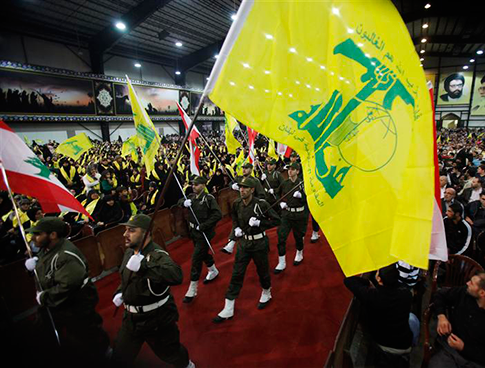By Adrian Croft
BRUSSELS (Reuters) - Britain said on Tuesday it had asked the European Union to put Hezbollah's military arm on its list of terrorist organizations, urging Europe to respond robustly to evidence of the Islamist group's involvement in an attack that killed five Israelis.
Britain's request came after Bulgaria accused the Lebanese militant movement in February of carrying out a bomb attack on a bus in the Black Sea city of Burgas that killed the Israelis and their Bulgarian driver in July last year.
Britain also cited a four-year jail sentence handed down by a Cypriot court in March to a Hezbollah member accused of plotting to attack Israeli interests on the island.
There is growing concern in the West about Iranian-backed Hezbollah's involvement in the Syrian conflict, although British sources denied this had prompted its request.
Britain's request will be discussed in early June by a special EU working group but it is likely to be difficult for Britain to convince all EU member states to support the proposal and achieve the required unanimity.
"We are calling for Europe to respond collectively and robustly following the atrocious terrorist attack at Burgas airport ... We firmly believe that an appropriate EU response would be to designate Hezbollah's military wing as a terrorist organization," a spokesman for Britain's Foreign Office said.
Putting Hezbollah's military arm on the EU's terror list would make it harder for the group to operate in Europe and would help prevent "any future attacks by this terrorist organization on European soil," the spokesman said.
Britain's move came as Hezbollah guerrillas fought their biggest battle yet for Syrian President Bashar al-Assad. About 30 Hezbollah fighters were killed on Sunday, Syrian activists said, along with 20 Syrian troops and militiamen loyal to Assad during fierce fighting in the rebel stronghold of Qusair, near the Lebanese border.
EUROPEAN CAUTION
The United States already lists Hezbollah as a terrorist organization and U.S. and Israeli authorities want the EU to do likewise. But many European governments are cautious about imposing sanctions on Hezbollah, arguing it could fuel tensions in the Middle East.
In Europe, only the Netherlands lists Hezbollah as a terrorist group, while Britain blacklists its military wing.
European governments and companies must cease any financial dealings with groups on the list.
Bulgaria presented the results of its bomb probe to EU foreign ministers on February 18, urging them to take a harder stance towards Hezbollah. But two days later, Bulgaria's government resigned after mass protests over an economic crisis.
Hezbollah has dismissed Bulgaria's accusations and accused Israel of waging a smear campaign against it.
Diplomat Marin Raikov, appointed Bulgaria's interim prime minister before May elections, said Bulgaria would not initiate the EU procedure for blacklisting Hezbollah. But any other EU government was free to do so.
Raikov said in March that some EU countries were "not sufficiently convinced" by the evidence Bulgaria had presented about Hezbollah's involvement in the bombing and pledged to provide more evidence.
The Bulgarian foreign ministry declined immediate comment on the British proposal on Tuesday.
French foreign ministry spokesman Philippe Lalliot said the EU working group should look at the Cypriot and Bulgarian probes and the increasing involvement of Hezbollah in the Syrian crisis.
"All the elements involving Hezbollah must be taken into consideration," Lalliot said.
France has traditionally been cautious about backing steps to sanction Hezbollah, fearing it could destabilize Lebanon and potentially put U.N. peacekeepers at risk, but in recent weeks it has said it would consider all options.
France, Lebanon's former colonial power, has about 900 troops as part of the U.N. peacekeeping force (UNIFIL).
